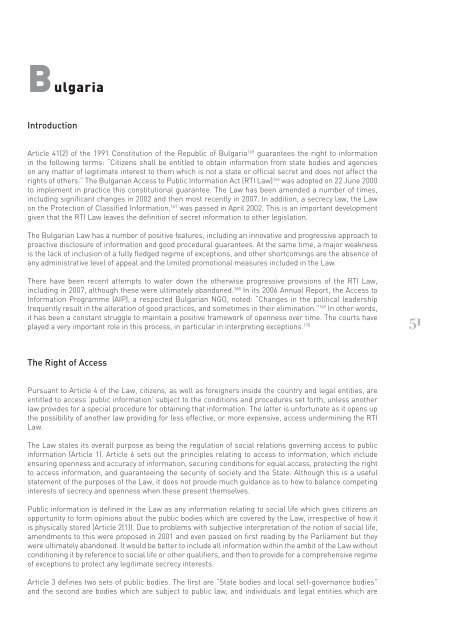Freedom of Information: A Comparative Legal Survey - Federation of ...
Freedom of Information: A Comparative Legal Survey - Federation of ...
Freedom of Information: A Comparative Legal Survey - Federation of ...
You also want an ePaper? Increase the reach of your titles
YUMPU automatically turns print PDFs into web optimized ePapers that Google loves.
B ulgaria<br />
Introduction<br />
Article 41(2) <strong>of</strong> the 1991 Constitution <strong>of</strong> the Republic <strong>of</strong> Bulgaria 165 guarantees the right to information<br />
in the following terms: “Citizens shall be entitled to obtain information from state bodies and agencies<br />
on any matter <strong>of</strong> legitimate interest to them which is not a state or <strong>of</strong>fi cial secret and does not affect the<br />
rights <strong>of</strong> others.” The Bulgarian Access to Public <strong>Information</strong> Act (RTI Law) 166 was adopted on 22 June 2000<br />
to implement in practice this constitutional guarantee. The Law has been amended a number <strong>of</strong> times,<br />
including signifi cant changes in 2002 and then most recently in 2007. In addition, a secrecy law, the Law<br />
on the Protection <strong>of</strong> Classifi ed <strong>Information</strong>, 167 was passed in April 2002. This is an important development<br />
given that the RTI Law leaves the defi nition <strong>of</strong> secret information to other legislation.<br />
The Bulgarian Law has a number <strong>of</strong> positive features, including an innovative and progressive approach to<br />
proactive disclosure <strong>of</strong> information and good procedural guarantees. At the same time, a major weakness<br />
is the lack <strong>of</strong> inclusion <strong>of</strong> a fully fl edged regime <strong>of</strong> exceptions, and other shortcomings are the absence <strong>of</strong><br />
any administrative level <strong>of</strong> appeal and the limited promotional measures included in the Law.<br />
There have been recent attempts to water down the otherwise progressive provisions <strong>of</strong> the RTI Law,<br />
including in 2007, although these were ultimately abandoned. 168 In its 2006 Annual Report, the Access to<br />
<strong>Information</strong> Programme (AIP), a respected Bulgarian NGO, noted: “Changes in the political leadership<br />
frequently result in the alteration <strong>of</strong> good practices, and sometimes in their elimination.” 169 In other words,<br />
it has been a constant struggle to maintain a positive framework <strong>of</strong> openness over time. The courts have<br />
played a very important role in this process, in particular in interpreting exceptions. 170<br />
The Right <strong>of</strong> Access<br />
Pursuant to Article 4 <strong>of</strong> the Law, citizens, as well as foreigners inside the country and legal entities, are<br />
entitled to access ‘public information’ subject to the conditions and procedures set forth, unless another<br />
law provides for a special procedure for obtaining that information. The latter is unfortunate as it opens up<br />
the possibility <strong>of</strong> another law providing for less effective, or more expensive, access undermining the RTI<br />
Law.<br />
The Law states its overall purpose as being the regulation <strong>of</strong> social relations governing access to public<br />
information (Article 1). Article 6 sets out the principles relating to access to information, which include<br />
ensuring openness and accuracy <strong>of</strong> information, securing conditions for equal access, protecting the right<br />
to access information, and guaranteeing the security <strong>of</strong> society and the State. Although this is a useful<br />
statement <strong>of</strong> the purposes <strong>of</strong> the Law, it does not provide much guidance as to how to balance competing<br />
interests <strong>of</strong> secrecy and openness when these present themselves.<br />
Public information is defi ned in the Law as any information relating to social life which gives citizens an<br />
opportunity to form opinions about the public bodies which are covered by the Law, irrespective <strong>of</strong> how it<br />
is physically stored (Article 2(1)). Due to problems with subjective interpretation <strong>of</strong> the notion <strong>of</strong> social life,<br />
amendments to this were proposed in 2001 and even passed on fi rst reading by the Parliament but they<br />
were ultimately abandoned. It would be better to include all information within the ambit <strong>of</strong> the Law without<br />
conditioning it by reference to social life or other qualifi ers, and then to provide for a comprehensive regime<br />
<strong>of</strong> exceptions to protect any legitimate secrecy interests.<br />
Article 3 defi nes two sets <strong>of</strong> public bodies. The fi rst are “State bodies and local self-governance bodies”<br />
and the second are bodies which are subject to public law, and individuals and legal entities which are<br />
51
















